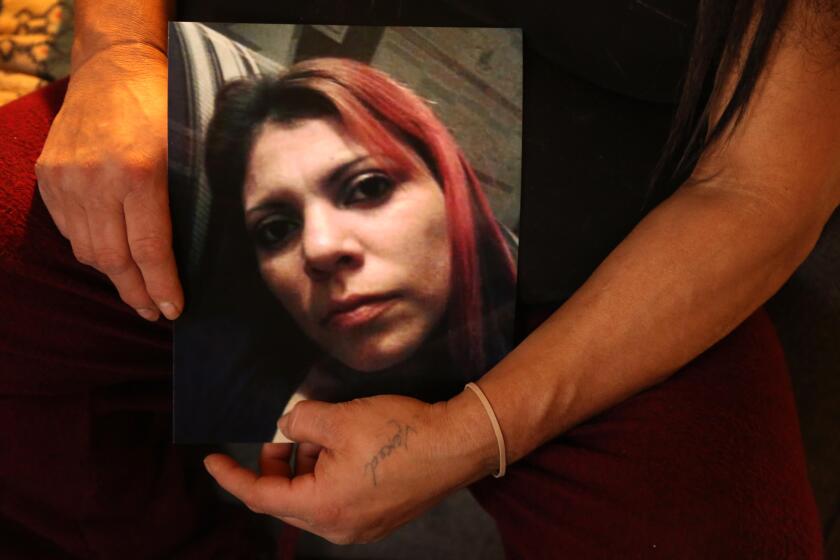Judge dismisses murder charge against Central Valley woman whose baby was stillborn

A judge on Thursday dismissed a murder charge against a Central Valley woman who prosecutors said delivered a stillborn baby after using methamphetamine, ruling the prosecution failed to present adequate evidence to support the accusation.
Chelsea Becker, 26, of Hanford had already been released into a treatment facility in March while awaiting trial. Before that, she had been ordered held on $5-million bond, which was later reduced to $2 million, and spent more than a year in jail after her arrest in November 2019.
Kings County Superior Court Judge Robert S. Burns on Thursday granted a motion by Becker’s attorneys to set aside the charge entirely, finding that prosecutors failed to prove she acted with implied malice, a standard that would have meant she had understood but disregarded the risk to her unborn child when she allegedly used methamphetamine while pregnant.
“Chelsea is incredibly relieved that this nightmare for her is over,” said her attorney Dan Arshack, a consulting counsel at National Advocates for Pregnant Women. “She’s looking forward to picking up the pieces and getting on with her life.”
Becker plans to remain in a drug treatment facility for the time being, he said. When he shared the news with her Thursday morning, she wept.
Arshack noted that the judge stopped short of ruling that the charge was not permitted under state law, as her legal team had sought.
“I’m elated that for Chelsea this case is over,” he said. “Sadly, however, the possibility of other women in California being charged with murder associated with having a stillbirth is still a distinct possibility and perhaps in Kings County even a likelihood.”
The prosecution can appeal the ruling or seek a second chance to present its case at a new preliminary hearing. Kings County Dist. Atty. Keith Fagundes’ office will review the record and the transcript of Thursday’s proceedings before deciding how to move forward, said Phil Esbenshade, the executive assistant district attorney.
Becker delivered a stillborn son, whom she named Zachariah, at Adventist Health Hanford on Sept. 10, 2019. Hospital staffers suspected she may have used drugs while pregnant and called the Kings County coroner’s office.
Nearly two months later, on Nov. 6, police arrested Becker. Fagundes charged her with murder, citing an autopsy report stating her unborn child had toxic levels of methamphetamine in his system.
The charge drew outrage from civil rights groups, and a legal team backed by National Advocates for Pregnant Women took on her case.
A California woman is at the center of a legal and ethical debate about how the justice system is policing women’s bodies and treating mothers with addiction.
“This is such an important victory,” Lynn Paltrow, executive director of National Advocates for Pregnant Women, said Thursday. “We are so grateful that Chelsea Becker was willing to fight this egregious charge to try to ensure that no one else has to face a murder charge for experiencing a stillbirth.”
Still, she said, the outcome was slightly bittersweet.
“This prosecution based on a misinterpretation of state law resulted in somebody being deprived of her liberty and exposed to the real danger of COVID for 16 months of her life,” she said. “This cost taxpayers innumerable dollars in terms of the incarceration as well as all of the time to pay for the prosecution in this case, money that could have been used to improve access to healthcare in their community.”
Becker’s lawyers argued the prosecution presented no evidence that Becker was aware using methamphetamine while pregnant could cause her to have a stillbirth.
“There are some good reasons why the prosecution didn’t produce any evidence of that,” Arshack said. “One is that there is absolutely no scientific evidence that establishes that the ingestion of methamphetamine while pregnant causes fetal demise.”
In fact, he pointed out, the lead officer on the case testified during a December preliminary hearing that Becker had told him she didn’t know what using the drug during pregnancy could do to her unborn child. Before the stillbirth, she had given birth three times while struggling with addiction, each time with no significant injury to the baby, Arshack said.
Becker’s defense also argued that the prosecution failed to prove that drug use caused her unborn child’s death. Although she had suffered from three reproductive tract infections that could have resulted in the stillbirth, the pathologist who performed her stillborn baby’s autopsy and determined the cause of death to be methamphetamine toxicity failed to consider any of them, her attorneys said.
The pathologist, Dr. Jue-Rong Zhang, testified during the preliminary hearing that he had not examined Becker’s medical records until the day of his testimony, which came more than a year after her arrest.
Adora Perez was imprisoned for delivering a stillborn baby after using drugs. Her case largely went unnoticed until another woman was charged.
Thursday’s ruling marked a major development in a high-stakes legal fight that advocates said could have had far-reaching implications for women’s rights in California, where a woman has never been convicted of murder in the death of her own unborn child. If the court allowed such a charge, they said, it would judicially rewrite the homicide statute, opening the door to the prosecution of any woman who has a miscarriage or stillbirth.
Fagundes had contended that the charge was permitted by a 1970 amendment to California’s murder statute that added a fetus as a potential victim. But a section in the law states it does not apply to acts “solicited, aided, abetted, or consented to by the mother of the fetus,” and multiple attempts to convict women of killing their unborn children have been knocked down by California courts.
Still, Burns in June sided with Fagundes’ interpretation, denying an application by Becker’s lawyers to dismiss the case because of the way the law is written. And in his ruling Thursday, he stated the charge should be dismissed because of evidentiary problems only, not improper application of the murder statute.
Burns began the ruling by making statements that suggest he believes the state’s murder statute could be used to punish anyone who has an abortion that isn’t permitted by California’s Reproductive Privacy Act, Paltrow said.
“Although that’s just dictum — words the judge is saying — it gives us a clue as to the kind of things that could happen if the Supreme Court does overturn Roe vs. Wade, or further limit it with statements regarding state interests or rights for fetuses,” she said.
Until a court rules on the underlying question of whether California law permits a woman to be charged with murder for killing her own fetus, advocates will need to deal with each case separately as it arises, they said.
“While we are thrilled that the case against Ms. Becker has been dismissed, we are disappointed that a dismissal on these grounds does not foreclose the possibility that a misguided prosecutor may attempt a similar prosecution in the future.” Becker’s attorney Jacqueline Goodman said in a statement. “As a result, we are left to play a sort of whack-a-mole, ever vigilant that we find and prevent any similar efforts to charge a woman with murder for the outcome of her pregnancy.”
California Atty. Gen. Rob Bonta said his office strongly believes the murder statute was never intended to prosecute women who have stillbirths or miscarriages. That view is in keeping with his predecessor, Xavier Becerra, who had submitted court filings calling for an end to Becker’s prosecution.
“The dismissal of the murder charges against Chelsea Becker today is a victory that we hope will prevent this misinterpretation of California law from happening in the future,” Bonta said Thursday in an interview with The Times. “It’s not lost on us that Ms. Becker was forced to fight over a year and a half, spending 16 months in jail after being wrongfully charged with the murder of her stillborn child.”
Like Becerra, Bonta also said his office would work to end the imprisonment of Adora Perez, 33, of Hanford.
Perez was charged with murder by Fagundes’ office in 2018 after she delivered a stillborn baby at Adventist Health Hanford and authorities alleged she had used methamphetamine while pregnant. She pleaded no contest to involuntary manslaughter and was sentenced to 11 years.
“My office’s stance is clear,” Bonta said. “Ms. Perez should not be in prison and should never have been charged with murder in the first place.”
Her attorneys, backed by the American Civil Liberties Union, are now working to appeal her case, saying her previous legal counsel was ineffective and never told her the murder charge lacked a legal basis.
A request to reopen Perez’s appeal was denied by an appeals court in March, and her attorneys are seeking relief in the state Supreme Court. A separate motion for the conviction to be overturned is pending before a Kings County Superior Court judge.
Even though Burns’ ruling in Becker’s case does not directly affect Perez, it has given her legal team hope, her attorney Mary McNamara said.
“I think this marks a turning point for these kinds of prosecutions, because I think they are now going to get the kind of judicial scrutiny that’s warranted,” McNamara said.
Perez’s charge was based on evidence that was similar to that in Becker’s case, McNamara added, and she’s hopeful the courts will rectify what she describes as “a grave and appalling injustice.”
In the meantime, she said, her client is struggling to keep her head up in prison as her legal fight grinds on.
“The greatest challenge for her, as it is with everybody in a situation where they’re going though the legal process after conviction, is the state of not knowing when or if there may be relief,” she said. “That, I think, is a psychological torment, and it’s extraordinarily difficult.”
More to Read
Sign up for Essential California
The most important California stories and recommendations in your inbox every morning.
You may occasionally receive promotional content from the Los Angeles Times.













